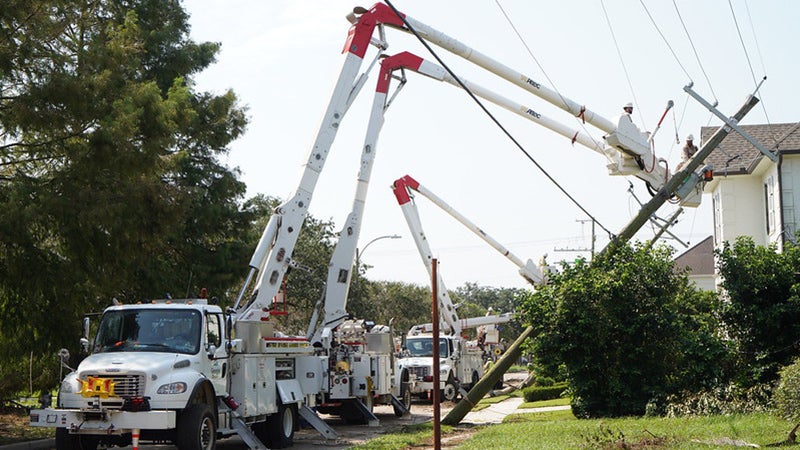Parish President defends $32M Isaac rebuild as ‘extremely successful’
Published 12:14 am Saturday, November 11, 2017

- St. John the Baptist Parish
LAPLACE — St. John the Baptist President Natalie Robottom said she is satisfied with the manner of how more than $32 million in Community Block Development Grants to assist residents rebuild their lives in the wake of Hurricane Isaac were distributed.
Robottom made her comments during a wide-ranging interview conducted with L’OBSERVATEUR via email. The parish president also answered critics who allege the money was mishandled and some residents even lofted accusations of theft.
“The assertion that money is being stolen is ludicrous and reflects a pervasive lack of understanding of federally funded programs,” Robottom said. “Such an accusation touches the local, state and federal levels and doesn’t take into account the amount of required paperwork and excessive oversight in spending federal funds.”
She conceded the program has not “moved forward as smoothly as intended,” but emphasized the process was “extremely successful by all accounts.”
The controversy bubbled during an Oct. 24 Parish Council meeting when Parish Councilman Michael Wright called for an independent audit to determine how the money was distributed to residents. During a lengthy discussion it was revealed 21 families would not be having their homes elevated, as they alleged was previously promised, simply because the program ran out of money.
Several residents passionately addressed the Council, wondering why some neighbors were having their homes elevated and they were not. Council members were questioning who to hold accountable for a $32 million grant to come up short at the end.
Perhaps adding to distrust was that Scott Reddoch of Royal Engineering, who oversaw distribution of the funds, at times had difficulty answering some of the Council’s most poignant questions.
According to Council members and residents, Reddoch allegedly said in a July meeting the remaining 55 families who were waiting on funding would have their homes repaired and elevated. However, as September rolled into October, with the funds rapidly dwindling, Reddoch informed 21 applicants that the program had run out of money and that although their homes would be repaired, they would not be elevated.
Robottom, who was not present at the July meeting and said she could not confirm that Reddoch said that, acknowledged if he did he “misspoke” in guaranteeing anything to residents. She said perhaps he was not aware of the shortfall at the time, which was a statement Reddoch offered during the Council meeting.
The parish resident, who admitted she did not have regular contact with Reddoch during the process, said she was first made aware of the shortfall in September. She noted when the program was initiated, parish officials were aware all of the homeowners would not be served, but anticipated repairing approximately 360 homes. She said that number did not include elevations.
In order to complete more homes, she revealed during the interview that budgeted money not fully utilized in other areas of the grant was re-allocated to the Homeowner Rehabilitation Program to meet the increased need.
According to Robottom, at least two other factors were in play as to why the program came up short. She said that following the devastating tornado in 2016, some of the CBDG distribution policies were amended to assist residents who were hit with the double whammy of tornado and Isaac damage, although it would subtract from other areas.
She said the parish, state and Housing of Urban Development approved the policy change.
“I stand by that decision,” Robottom said, noting the additional repairs were not included in the initial housing repair budget.
Also muddying the waters was the fact that the original elevation estimates came up woefully short. In fact, the initial policy called for a cap of $75,000 to elevate a house but bids consistently came in well more than $100,000 per home.
Consequently, the policy was amended to cap the elevation cost at $175,000 per home, thus decreasing the number of homes being served and accounting for $1.8 million in change orders, a fact that astonished and angered several Council members.
Robottom pointed out the cost of elevating a home in St. John Parish is averaging $108,000, as compared to $120,000 to $150,000 in neighboring parishes.
“I am extremely disappointed in the negativity generated by complaints from seven of 21 homeowners who are dissatisfied their homes will be repaired but not elevated,” Robottom said. “It is even more unsettling to find out that four of the seven homeowners in attendance at the Council meeting have not submitted all of the required paperwork to move forward with their repairs.”
She noted that of the 315 homes that met eligibility requirements, 10 homes were rebuilt, 197 repaired, six elevated and two repaired and elevated. She added 18 business owners received small grants/loans and 11 blighted properties are in the process of being demolished at no cost to the parish.
Robottom provided a breakdown of the $32 million, revealing $5 million was allocated to the St. John Parish School board for school bus replacements, $5.56 million to the parish housing authority for construction of 23 new housing units, $3.5 million for the elevation program, $350,000 for the demo and clearance of the 11 homes, $1.9 million to the Small Business Grants and Loan Program, $2.59 million to the Small Rental Rehab Program and $13 million to the Homeowner Rehab Program.
Robottom said the CBDG grant is the second home rehabilitation program implemented during her tenure and each provides a learning opportunity. She also expressed concern that the parish was given a relatively small window of five to seven years to allocate the funding.
“The parish is not in the construction business, which is why consultants were retained and contracts secured,” she said. “We continue to review and revise policies and procedures as needed and are continuing to hone our skills in this area.”
She punctuated her statement by saying that in the future more attention will be focused on the eligibility process to guarantee those most in need are being served and to “weed out fraudulent applicants and those with means and resources to help themselves.”
The council meets Tuesday at the parish courthouse in Edgard. The finance committee starts at 6 p.m., and the full council meeting begins at 6:30 p.m.
— By Richard Meek





